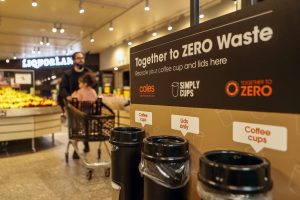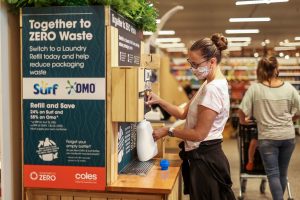(Featured image: Jane Mansfield, Coles Energy Director, Lal Lal Wind Farm)
Coles is launching a new and updated sustainability strategy as part of its plan to be the most sustainable supermarket in Australia.
The strategy starts with targets to further reduce greenhouse gas emissions, commit to 100% renewable electricity and set net greenhouse gas emissions to zero.
Coles announces its climate change statement and goals:
- Deliver zero net greenhouse gas emissions by 2050;
- So that the entire Coles Group will run 100% with renewable electricity by the end of fiscal year 25;
- Reduction of the combined greenhouse gas emissions of Scope 1 and 2 by more than 75% by the end of fiscal year 30 (compared to the starting value for fiscal year 20).
The new goals come to life at the launch of Coles' newest sustainability concept store in Moonee Ponds, Victoria.
"As part of these goals we are setting ourselves today, we are excited to introduce Together to Zero, which underscores our commitment to working with all stakeholders to achieve zero net greenhouse gas emissions," said Steven Cain, CEO of the Coles Group.
"An integral part of our quest to be Australia's most sustainable supermarket will be to reduce our environmental footprint and we have a responsibility to help create a better Australia for future generations."
 Lal Lal wind farms
Lal Lal wind farms
In addition, the Coles Group has signed an agreement with the Lal Lal wind farms near Ballarat, Victoria.
This will further increase Coles’s renewable electricity to 45% of total consumption by fiscal year 23.
As of July 2022, Coles will get more than 90% of its electricity needs in Queensland from renewable sources.
Emissions, waste & hunger
"Together to Zero" also includes a long-term pursuit of zero emissions, zero waste and zero hunger.
Coles wants to help customers understand which packaging they can and cannot recycle by adding the recycling logo to their Coles branded products.
Their partnerships are also helping Australians in need while improving sustainability scores, including through food donations, the equivalent of more than 138 million meals since 2011.
For more information on the Coles Group's position paper on climate change, please click here.



 Lal Lal wind farms
Lal Lal wind farms
